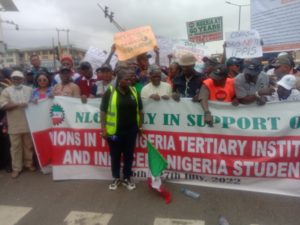40 percent of hotel revenues goes to diesel and generator maintenance – Iye Williams Adegbe, HAPSSSA President

The outbreak of COVID-19 pandemic, had a profound impact on the hospitality sector in Nigeria as a whole. Rising inflation, fuel prices, and operational costs have created enormous challenges for both employers and employees in the sector.
In this interview with Iye Williams Adegbe, President of the Hotel & Personal Services Senior Staff Association of Nigeria (HAPSSSA), he expressed that if government could ensure a reliable power supply, hotels would save significantly on costs, which could then be redirected toward better wages and improved services.
He lamented that workers have been at the receiving end of the economic crisis in Nigeria, noting that the N70,000 Minimum Wage is insufficient to cover basic living expenses, let alone provide a decent quality of life.
Isola also speaks on how insecurity in various parts of the country has further crippled the sector, employers continuous exploitations and threats to workers’ rights, needs for government intervention and other issues of national importance.
Except:
Nigeria’s economy
The economy has had a profound impact on our union and the hospitality sector as a whole. Rising inflation, fuel prices, and operational costs have created enormous challenges for both employers and employees. For instance, in the hotel industry, power supply is a significant issue. Most hotels rely heavily on industrial generators because of the unreliable electricity grid. These generators consume vast quantities of diesel, which is not only costly but also difficult to sustain in the long run. A hotel like Hilton or Sheraton requires industrial-grade generators, and just starting them alone can consume 10 to 12 litre cans of diesel.
This expense, coupled with maintenance, puts a strain on hotel operations. It is not just about the financial burden; it is about staying competitive. In addition, insecurity in various parts of the country has further crippled the sector. The northern region, for instance, has seen tourism drop to near-zero levels due to concerns about safety. Guests are hesitant to stay in hotels in areas where they do not feel secure. Hotels are meant to be spaces of relaxation, but when guests are unable to relax because of external threats, it defeats the purpose. All these factors create a challenging environment for our union and the workers we represent.
Workers coping with challenges
Workers are at the receiving end of economic crisis in Nigeria. They are the ones bearing the brunt of these difficulties. Since COVID-19, there has been a major shift in workforce dynamics. During the pandemic, hotels reduced their workforce by nearly 50 percent to cut costs. Unfortunately, this reduction has continued, with no real effort to rehire workers that were initially let off. Workers who remain are now doing the jobs of two or three people, which is unsustainable.
For example, tasks that used to require four workers are now handled by one or two. This over-labour leads to burnout, stress, and even physical health issues. Employers, however, are more focused on maximizing profits and cutting costs than on the well-being of their staff. As a result, employees are constantly pushed beyond their limits, often without adequate rest or support.
Beyond workload, there is also the issue of stagnant wages. Many workers cannot afford basic necessities, let alone save for the future. It is a dire situation, and while we, as a union, are doing our best to address these issues, the systemic challenges make it an uphill battle.
Challenges with worker unionisation
Unionisation is becoming increasingly difficult due to resistance from employers. Many employers actively discourage their workers from joining unions by threatening job loss. For example, when new employees are hired, they are often warned not to join unions. If they do, they risk immediate termination or non-renewal of their contracts.
Additionally, short-term contracts have become a tool for employers to evade unionization. Many hotels now hire workers on two-year contracts and refuse to renew them if they are union members. Hotels like Sheraton and Protea are examples of establishments where union efforts have been resisted. Workers in these establishments are often too afraid to stand up for their rights because they know how hard it is to find another job in this economy.
This reluctance weakens the union’s ability to protect workers. Without unionisation, workers are left vulnerable to exploitation, with no one to advocate for fair treatment or improved conditions.
Actions taken to address the challenges
We have been proactive in addressing these issues. One of our key strategies has been to engage with employers and advocate for fair practices. When these discussions fail, we escalate matters to the Ministry of Labour. However, the Ministry’s role is mostly advisory. They can recommend that employers respect unionization rights, but they lack enforcement powers.
In some cases, we have had to take legal action. For example, when Radisson Blu in Victoria Island sacked over 360 workers overnight, we filed a case in court. Similarly, cases involving Federal Palace Hotel are ongoing. Unfortunately, the judicial system is slow, with some cases dragging on for over seven years.
Despite these challenges, we continue to fight for our members. We are also working to educate workers about their rights and the benefits of unionisation, even in the face of employer resistance.
Sufficiency of N70,000 Minimum Wage
Not at all. N70,000 is insufficient to cover basic living expenses, let alone provide a decent quality of life. Let me give you a practical example: a worker earning N70,000 might spend N80,000 on transportation alone, depending on their location and daily commute.
Beyond transportation, workers must also pay for rent, food, school fees, utilities, and more.
In Nigeria, individuals often have to take on responsibilities that should fall under government services. For instance, workers must generate their own electricity, dig boreholes for water, and even hire private security for their neighbourhoods. All these expenses come out of their salaries, leaving little to nothing for savings or emergencies.
When we talk about a minimum wage, it should reflect the actual cost of living. At N70,000, workers are barely surviving. It is a grim reality that needs urgent attention.
Workers empowerment for sustainability
Yes, we have established several training programs to help workers develop additional skills and income streams. These programs cover a range of topics, from farming and animal husbandry to investment strategies. For example, we have organised workshops on snail farming, crop production, and stock market investments among other things.
The idea is to empower workers to explore alternative income sources without conflicting with their job roles. Many of our members have successfully ventured into side businesses, such as poultry farming or trading, which provide them with supplementary income.
We emphasise the importance of financial independence because relying solely on salaries is no longer sustainable. These training sessions have been well-received, and we are committed to continuing them to support our members’ long-term well-being.
Demands from the government
The government needs to take concrete steps to support the hospitality sector. First, they should provide low-interest loans to help businesses stay afloat. Many hotels are struggling with operational costs, and access to affordable credit could make a significant difference.
Second, stable electricity is crucial. About 40 percent of hotel revenue currently goes to diesel and generator maintenance. If the government could ensure a reliable power supply, hotels would save significantly on costs, which could then be redirected towards better wages and improved services.
Lastly, the government should address the issue of multiple taxation. Hotels are burdened with various taxes from different levels of government, which eats into their profits. Streamlining and harmonizing these taxes would reduce the financial strain on businesses.
If the government can address these issues, it would create a ripple effect—businesses would thrive, workers would receive better pay, and the economy as a whole would benefit.
Final thoughts
My final message is that we must all work together, government, employers, unions, and workers—to create a sustainable and equitable environment. The challenges we face are significant, but with the right policies and collective effort, we can overcome them.




